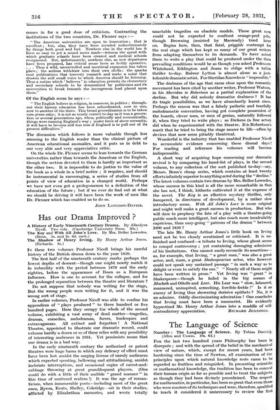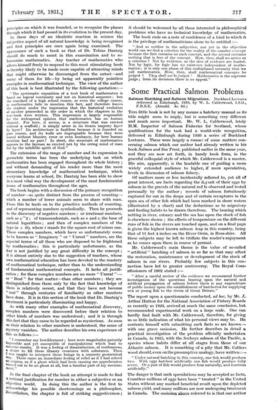The Language of Science Number : The Language of Science.
By Tobias Dantzig• (Allen and Unwin. 10s. 6d.)
Fon the last two hundred years Philosophy has been in disrepute ; and with the spread of the belief in the mechanical view of nature, which, except for recent years, had been hardening since the time of Newton, all examination of the principles upon which natural knowledge rests came to be regarded as fruitless and misguided. In presenting scientific or mathematical knowledge, the tradition has been to conceal their human origin as far as possible and to treat the subjects as though they had been divinely preordained. The respect for mathematics, in particular, has been so great that even those who were masters of its techniques and were, therefore, qualified to teach it considered it unnecessary to review the first principles on which it was founded, or to recognize the phases through which it had passed in its evolution to the present day. In these days of an idealistic reaction in science the subjective aspect of all natural knowledge is being recognized and first principles are once again being examined. The appearance of such a book as that of Dr. Tobias Dantzig should do much to assist in this examination and to re- humanize mathematics. Any teacher of mathematics who allows himself freely to-respond to this most stimulating book is thereby likely to be made more capable of attracting minds that might otherwise be discouraged from the outset—and many of them for life—by being set apparently pointless examples in mathematical technique. The view of the author of this book is best illustrated by the following quotation :—
" The systematic exposition of a text book of mathematics is based on logical continuity and not on historical sequence ; but the standard of a high school course, or even the college course, in mathematics fails to mention this fact, and therefore leaves the student under the impression that the historical evolution of number proceeded in the order in which the chapters in the text-book were written. This impression is largely responsible for the widespread opinion that mathematics has no human element. For here, it seems, is a structure that was erected without a scaffold ; it Simply arose in its frozen majesty layer by layer I Its architecture is faultless because it is founded on pure reason, and its walls are impregnable because they were reared without blunder, error or even hesitancy, for here human intuition had no part ! In short, the structure of mathematics appears to the layman as erected not by the erring mind of man but by the infallible spirit of God."
The extension of the range of number and its expression in geometric terms has been the underlying task on which mathematics has been engaged throughout its whole history ; and without demanding of his reader more than the most elementary knowledge of mathematical technique, which everyone learns at school, Dr. Dantzig has been able to show in a most vital way the development of the most fundamental issues of mathematics throughout the ages.
The book begins with a discussion of the primary recognition
of number—as quite distinct from the process of counting— which a number of lower animals seem to share with man. From this he leads on to the primitive methods of counting, and of representing numbers symbolically. Then he proceeds to the discovery of negative numbers ; or irrational numbers, such as /2; of transcendentals, such as 1r and e, the base of natural logarithms ; and then of complex numbers of the type (a ib), where i stands for the square root of minus one.
These complex numbers, which have so unfortunately come to be known as " Imaginary" or " Unreal " numbers, are the especial terror of all those who are disposed to be frightened by mathematics ; this is particularly unfortunate, as the fear is not justified by any great difficulty in the concept ; it is almost entirely due to the suggestion of teachers, whose
own mathematical education has been devoted to the mastery of mathematical technique, rather than to the understanding
of fundamental mathematical concepts. It lacks all justifi- cation; for these complex numbers are no more "Unreal " — or " Real " for that matter—than other numbers ; they are distinguished from them only by the fact that knowledge of them is relatively recent, and that they have not become " real " through centuries of familiarity as other numbers have done. It is in this section of the book that Dr. Dantzig's treatment is particularly illuminating and happy.
As with many other examples of. mathematical discovery, complex numbers were discovered before their relation to other kinds of numbers was understood ; and it is through
this fact that they came to be regarded as mysterious. As soon as their relation to other numbers is understood, the sense of
mystery vanishes. The author describes his own experience of this as follows
I remember my bewilderment ; here were magnitudes patently impossible and yet susceptible of manipulations which lead to Concrete results. It was a feeling of dissatisfaction, of restlessness,
S desire to fill these illusory creatures with substance. Then I Was taught to interpret these beings in a concrete geometrical Y. There came an immediate feeling of relief as if I had solved an enigma, as if a ghost which had been causing me apprehension
turned out to be no ghost at all, but a familiar part of my environ. roent."
In the final chapter of the book an attempt is made to find a rational justification for number in either a subjective or an objective world. In doing this the author is the first to acknowledge his possible shortcomings as a philosopher, Nevertheless, the chapter is full of striking suggestiveness ; it should be welcomed by all those interested in philosophical problems who have no technical knowledge of mathematics. The book ends on a note of confidence of a kind to which it is the privilege of mathematicians alone to be entitled :— " And so neither in the subjective, nor yet in the objective world can we find a criterion for the reality of the number concept because the first contains no such concept, and the second contains nothing that is free of the concept. How, then, shall we arrive at a criterion ? Not by evidence, as the dice of evidence are loaded. Not by logic, for logic has no existence independent of mathe.. matics ; it is only one phase of this multiphased necessity that we call mathematics. How, then, shall mathematical concepts be judged ? They shall not be judged ! Mathematics is the supreme judge ; from its decisions there is no appeal."












































 Previous page
Previous page